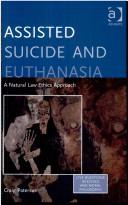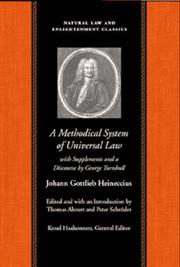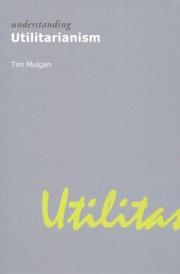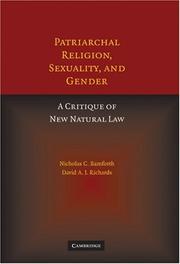| Listing 1 - 10 of 10 |
Sort by
|
Book
ISBN: 128219254X 9786612192548 1443808938 9781443808934 1847186432 9781847186430 6612192542 Year: 2008 Publisher: Newscastle upon Tyne : Cambridge Scholars Pub.,
Abstract | Keywords | Export | Availability | Bookmark
 Loading...
Loading...Choose an application
- Reference Manager
- EndNote
- RefWorks (Direct export to RefWorks)
Modern moral and political philosophy is in debt with natural law theory, both in its ancient and mediaeval elaborations. While the very notion of a natural law has proved highly controversial among 20th Century scholars, the last decades have witnessed a renewed interest in it. Indeed, the threats and challenges as result of multiculturalism, plural societies and global changes have generated a renewed attention to natural law theory. Clearly, it offers solid basis as possible framework to...
Natural law --- Natural law. --- Law of nature (Law) --- Natural rights --- Nature, Law of (Law) --- Rights, Natural --- Law --- History. --- Religious aspects.

ISBN: 1351575082 1315096765 1351575074 1281332755 9786611332754 0754692957 9780754692959 6611332758 9780754657453 0754657450 9780754657460 0754657469 9781315096766 Year: 2008 Publisher: Aldershot, England Burlington, VT Ashgate
Abstract | Keywords | Export | Availability | Bookmark
 Loading...
Loading...Choose an application
- Reference Manager
- EndNote
- RefWorks (Direct export to RefWorks)
"As medical technology advances and severely injured or ill people can be kept alive and functioning long beyond what was previously medically possible, the debate surrounding the ethics of end-of-life care and quality-of-life issues has grown more urgent. In this lucid and vigorous new book, Craig Paterson discusses assisted suicide and euthanasia from a fully fledged but non-dogmatic secular natural law perspective. He rehabilitates and revitalises the natural law approach to moral reasoning by developing a pluralistic account of just why we are required by practical rationality to respect and not violate key demands generated by the primary goods of persons, especially human life. Important issues that shape the moral quality of an action are explained and analysed: intention/foresight; action/omission; action/consequences; killing/letting die; innocence/non-innocence; and, person/non-person. Paterson defends the central normative proposition that 'it is always a serious moral wrong to intentionally kill an innocent human person, whether self or another, notwithstanding any further appeal to consequences or motive'."--Provided by publisher.
Assisted suicide --- Euthanasia --- Natural law. --- Law of nature (Law) --- Natural rights --- Nature, Law of (Law) --- Rights, Natural --- Law --- Moral and ethical aspects. --- Medical ethics

ISBN: 1614878080 9781614878087 9780865974784 0865974780 9780865974791 0865974799 Year: 2008 Publisher: Indianapolis Liberty Fund
Abstract | Keywords | Export | Availability | Bookmark
 Loading...
Loading...Choose an application
- Reference Manager
- EndNote
- RefWorks (Direct export to RefWorks)
Natural law --- Natural law. --- International law. --- Law of nations --- Nations, Law of --- Public international law --- Law --- Law of nature (Law) --- Natural rights --- Nature, Law of (Law) --- Rights, Natural --- International law
Book
ISBN: 1614878722 9781614878728 9780865974500 0865974500 9780865974517 0865974519 Year: 2008 Publisher: Indianapolis, IN Liberty Fund
Abstract | Keywords | Export | Availability | Bookmark
 Loading...
Loading...Choose an application
- Reference Manager
- EndNote
- RefWorks (Direct export to RefWorks)
The 18th century was a wealth of knowledge, exploration and rapidly growing technology and expanding record-keeping made possible by advances in the printing press. In its determination to preserve the century of revolution, Gale initiated a revolution of its own: digitization of epic proportions to preserve these invaluable works in the largest archive of its kind. Now for the first time these high-quality digital copies of original 18th century manuscripts are available in print, making them highly accessible to libraries, undergraduate students, and independent scholars. This collection reveals the history of English common law and Empire law in a vastly changing world of British expansion. Dominating the legal field is the Commentaries of the Law of England by Sir William Blackstone, which first appeared in 1765. Reference works such as almanacs and catalogues continue to educate us by revealing the day-to-day workings of society. -- Description from http://www.amazon.com (July 13, 2012).
International law. --- War (International law) --- Natural law. --- Law of nature (Law) --- Natural rights --- Nature, Law of (Law) --- Rights, Natural --- Law --- Hostilities --- International law --- Neutrality --- Law of nations --- Nations, Law of --- Public international law --- Natural law --- War (International law).

ISBN: 1317493559 1315711974 1282943340 9786612943348 1844653862 9781315711973 9780773594876 0773594876 9780773533288 0773533281 9780773533295 077353329X 9781844653867 9781317493556 1844650812 9781844650811 9781844650903 9781844650804 1844650804 9781317493532 9781317493549 1317493540 9781282943346 6612943343 Year: 2008 Publisher: Stocksfield Acumen
Abstract | Keywords | Export | Availability | Bookmark
 Loading...
Loading...Choose an application
- Reference Manager
- EndNote
- RefWorks (Direct export to RefWorks)
The language of rights pervades modern social and political discourse, yet there is deep disagreement amongst citizens, politicians and philosophers about just what rights are. In this comprehensive and engaging introduction to rights, Duncan Ivison pays particular attention to their political character: the way arguments about rights are characterized by disagreement and conflict and by movement between the moral and the legal and the abstract and the practical. Ivison presents three basic ways of thinking about rights as statuses, instruments and conduits and, drawing on the history of political thought and contemporary political theory, explores the different ways these frameworks shape particular theories of rights. He uses some of the current debates over the threat of global terrorism to explore the nature of rights, especially those civil and political rights at the heart of liberal democracy. Various critiques of rights Marxist, postmodernist and feminist are examined and the book concludes by exploring what, exactly, we should want from a theory of human rights today and what role this theory should play in global politics. The book offers a distinctive integration of history and theory as applied to questions about the nature of rights today and is ideally suited for students taking courses on moral and political philosophy, political theory and the history of political thought.
Law, Politics & Government --- Human Rights --- Civil rights --- Human rights --- Natural law --- Political science --- Political philosophy --- Law of nature (Law) --- Natural rights --- Nature, Law of (Law) --- Rights, Natural --- Law --- Philosophy. --- Political philosophy. Social philosophy --- Natural law.
Book
ISBN: 9782802725954 2802725955 Year: 2008 Volume: 2 Publisher: Bruxelles: Bruylant,
Abstract | Keywords | Export | Availability | Bookmark
 Loading...
Loading...Choose an application
- Reference Manager
- EndNote
- RefWorks (Direct export to RefWorks)
Nos sociétés recherchent des principes d'action, en particulier de législation, dont la justice ne soit pas fondée uniquement sur le fait qu'ils sont énoncés dans un code. Où chercher cette légitimité qui échappe à l'arbitraire du moment? L'histoire a décliné ses références: le consentement populaire, la tradition, le génie du peuple, la décision, l'idéal commun, la raison, la religion... L'expression droit naturel a souvent cristallisé cet enseignement du passé, mais la formule a-t-elle encore un sens aujourd'hui? En d'autres termes, faut-il en relancer l'histoire? "Il s'agit donc de signifier une exigence peu commune, quelque chose comme une normativité pure. J'y verrais volontiers une entreprise pluriséculaire et, de ce point de vue, les contributions ici offertes au titre d'une histoire du concept vaudraient pour nous aussi bien comme la mise en scène d'un travail du concept." (extrait de la postface de jean-Marc Ferry, Université libre de Bruxelles). Le comité éditorial, réuni aux Facultés universitaires Notre-Dame de la Paix (Namur), a sollicité, de part et d'autre de l'Atlantique, la contribution de quinze auteurs afin qu'ils exposent ici le sens et la portée que les grandes figures de la philosophie du droit, de l'Antiquité à la Modernité, attribuent au concept de droit naturel. Précédés d'un Grand angle qui les resitue sur la ligne du temps, ces différents Focus sont suivis de quatre Contre-jours qui les synthétisent dans une relecture chaque fois particulière. Après Platon, Aristote, Cicéron, Augustin, al Fârâbî, Maïmonide, Thomas d'Aquin, Grotius, Hobbes, Locke, Spinoza, Rousseau, Kant, Fichte, et Hegel, nous voici invités, juristes et philosophes, à affronter les mêmes questions qu'eux.
Natural law --- Droit naturel --- Law of nature --- Natural rights --- Nature [Law of ] --- Natuurrecht --- Recht [Natuur] --- Rights [Natural ] --- BPB0901 --- natuurrecht --- droit naturel --- Nature, Law of --- Rights, Natural --- Law --- Natural law. --- Law of nature (Law) --- Nature, Law of (Law) --- Droit --- Philosophie --- luonnonoikeus --- naravno pravo --- prigimtinė teisė --- natural law --- e drejta natyrore --- prirodzené právo --- φυσικό δίκαιο --- direito natural --- derecho natural --- diritto naturale --- Naturrecht --- dabiskās tiesības --- dritt naturali --- naturret --- drept natural --- természetjog --- prawo natury --- přirozené právo --- naturrätt --- природен закон --- loomuõigus --- prirodno pravo --- природно право --- natuurlijk recht --- naturlig rättighet --- naturlig ret --- natürliches Recht --- naturlig rätt --- dlí nádúrtha
Book
ISSN: 03448142 ISBN: 9783110203141 3110203146 9786611993405 1281993409 3110209985 9783110209983 Year: 2008 Volume: 84 Publisher: Berlin: de Gruyter,
Abstract | Keywords | Export | Availability | Bookmark
 Loading...
Loading...Choose an application
- Reference Manager
- EndNote
- RefWorks (Direct export to RefWorks)
Die Theorie des Thomas Hobbes hat in der Vergangenheit stark abweichende Deutungen erfahren und Anlass zu zahlreichen lang anhaltenden Debatten geliefert. Die Diskussion hat jedoch allgemein darunter gelitten, dass Hobbes' Schriften von der überwiegenden Anzahl der Interpreten wie ein in sich zusammenhängender Textkorpus behandelt und die Unterschiede zwischen den verschiedenen Werken nicht hinreichend gewürdigt worden sind. In besonderem Maße trifft das auf die Naturzustandstheorie zu, die im Zentrum der Hobbes'schen Argumentation steht und in großem Maß für die Entstehung und das Fortdauern der genannten Debatten verantwortlich zu machen ist. Ziel der vorliegenden Arbeit ist es, die verschiedenen Fassungen der Naturzustandstheorie endlich einer umfassenden vergleichenden Analyse zu unterziehen, und zwar unter konsequenter Einbeziehung des gerade in der deutschen Hobbes-Forschung kaum beachteten Textes des lateinischen Leviathan. Wie sich eindrucksvoll zeigt, vermag der eingehende Vergleich der Schriften nicht nur einen wichtigen Beitrag zum Verständnis von Hobbes' philosophischer Entwicklung und zur Bestimmung des Stellenwertes des lateinischen Leviathan zu leisten. Er liefert auch einen wichtigen Beitrag zur kritischen Bewertung der vorliegenden Hobbes-Interpretationen und zur Auflösung einiger zentraler Debatten.
Natural law --- History --- Hobbes, Thomas, --- De cive (Hobbes). --- Leviathan or the matter, form and power of a commonwealth ecclesiastical and civil (Hobbes). --- Natuurrecht. --- Politische Philosophie. --- The elements of law, natural and politic (Hobbes). --- Law of nature --- Natural rights --- Nature, Law of --- Rights, Natural --- Law --- Hobbes, Thomas --- Law of nature (Law) --- Nature, Law of (Law) --- Gobbs, Tomas, --- Hobbs, Thomas, --- Gobbes, Tomas, --- T. H. --- H., T. --- Hobs, Thomas, --- Hobbes, --- Hobbes, Thom. --- Hobbius, Thomas, --- Hobbuzu, Tomasu, --- Huobusi, --- Hobbs, Tho. --- הובס, תומס, --- 霍布斯, --- ホッブズ, トマス, --- Natural law - History - 17th century --- Hobbes, Thomas, - 1588-1679 --- Hobbes, Thomas, - 1588-1679 - De cive --- Hobbes, Thomas, - 1588-1679. - Leviathan --- Contract Theory. --- Hobbes, Thomas. --- Natural Law. --- Natural Rights. --- State of Nature.

ISBN: 1107179408 1281982237 9786611982232 0511464053 0511550944 0511462476 0511464797 0511461720 051146326X 9780511464058 9780511464799 9780511550942 0521868637 9780521868631 9780521173360 9781107179400 9781281982230 661198223X 9780511462474 9780511461729 0521173361 Year: 2008 Publisher: Cambridge Cambridge University Press
Abstract | Keywords | Export | Availability | Bookmark
 Loading...
Loading...Choose an application
- Reference Manager
- EndNote
- RefWorks (Direct export to RefWorks)
Legal theorists are familiar with John Finnis's book Natural Law and Natural Rights, but usually overlook his interventions in US constitutional debates and his membership of a group of conservative Catholic thinkers, the 'new natural lawyers', led by theologian Germain Grisez. In fact, Finnis has repeatedly advocated conservative positions concerning lesbian and gay rights, contraception and abortion, and his substantive moral theory (as he himself acknowledges) derives from Grisez. Bamforth and Richards provide a detailed explanation of the work of the new natural lawyers within and outside the Catholic Church - the first truly comprehensive explanation available to legal theorists - and criticize Grisez's and Finnis's arguments concerning sexuality and gender. New natural law is, they argue, a theology rather than a secular theory, and one which is unappealing in a modern constitutional democracy. This book will be of interest to legal and political theorists, ethicists, theologians and scholars of religious history.
Natural law. --- Sex and law. --- Natural law --- Law and sex --- Sex --- Sex crimes --- Law of nature (Law) --- Natural rights --- Nature, Law of (Law) --- Rights, Natural --- Law --- Religious aspects --- Catholic Church. --- Law and legislation --- Sex and law --- Religious aspects&delete& --- Catholic Church --- General and Others --- Homophobia --- Norms --- Patriarchy --- Religion --- Religious rights --- Sexism --- Sexuality --- Book --- Conservatism
Book
ISBN: 1282053035 9786612053030 0191539619 9780191539619 9780192806109 0192806106 Year: 2008 Publisher: Oxford Oxford University Press
Abstract | Keywords | Export | Availability | Bookmark
 Loading...
Loading...Choose an application
- Reference Manager
- EndNote
- RefWorks (Direct export to RefWorks)
"Hegel's Outlines of the Philosophy of Right is one of the greatest works of moral, social, and political philosophy. It contains significant ideas on justice, moral responsibility, family life, economic activity, and the political structure of the state - all matters of profound interest to us today." "This new edition combines a revised translation with a cogent introduction to his work."--
Law --- Natural law. --- State, The. --- Political science. --- Ethics. --- Deontology --- Ethics, Primitive --- Ethology --- Moral philosophy --- Morality --- Morals --- Philosophy, Moral --- Science, Moral --- Philosophy --- Values --- Administration --- Civil government --- Commonwealth, The --- Government --- Political theory --- Political thought --- Politics --- Science, Political --- Social sciences --- State, The --- Sovereignty --- Political science --- Law of nature (Law) --- Natural rights --- Nature, Law of (Law) --- Rights, Natural --- Jurisprudence --- Philosophy. --- Legal theory and methods. Philosophy of law --- Hegel, Georg W.F.

ISBN: 9780754657460 9780754657453 Year: 2008 Publisher: Aldershot Ashgate
Abstract | Keywords | Export | Availability | Bookmark
 Loading...
Loading...Choose an application
- Reference Manager
- EndNote
- RefWorks (Direct export to RefWorks)
As medical technology advances and severely injured or ill people can be kept alive and functioning long beyond what was previously medically possible, the debate surrounding the ethics of end-of-life care and quality-of-life issues has grown more urgent.In this lucid and vigorous new book, Craig Paterson discusses assisted suicide and euthanasia from a fully fledged but non-dogmatic secular natural law perspective. He rehabilitates and revitalises the natural law approach to moral reasoning by developing a pluralistic account of just why we are required by practical rationality to respect and not violate key demands generated by the primary goods of persons, especially human life.Important issues that shape the moral quality of an action are explained and analysed: intention/foresight; action/omission; action/consequences; killing/letting die; innocence/non-innocence; and, person/non-person. Paterson defends the central normative proposition that 'it is always a serious moral wrong to intentionally kill an innocent human person, whether self or another, notwithstanding any further appeal to consequences or motive'. Discusses assisted suicide and euthanasia from a secular natural law perspective. This book explains issues that shape the moral quality of an action: intention/foresight; action/omission; action/consequences; killing/letting die; innocence/non-innocence; and, person/non-person.
Natural law --- Medical law --- Professional ethics. Deontology --- hulp bij zelfdoding --- levenseinde (einde van het leven, levenseindebeslissing) --- euthanasie (hulp bij zelfdoding) --- moraalfilosofie --- ethiek (ethische aspecten) --- levenskwaliteit --- pijn (lijden, pijnbestrijding) --- assistance au suicide (aide au suicide) --- fin de vie (décision de fin de vie) --- euthanasie (suicide assistée) --- philosophie morale --- ethique (aspects ethiques) --- qualité de vie (années de vie ajustées sur la qualité) --- douleur (souffrance, lutte contre la douleur) --- Assisted suicide --- Euthanasia --- Law of nature (Law) --- Natural rights --- Nature, Law of (Law) --- Rights, Natural --- Law --- Moral and ethical aspects
| Listing 1 - 10 of 10 |
Sort by
|

 Search
Search Feedback
Feedback About UniCat
About UniCat  Help
Help News
News